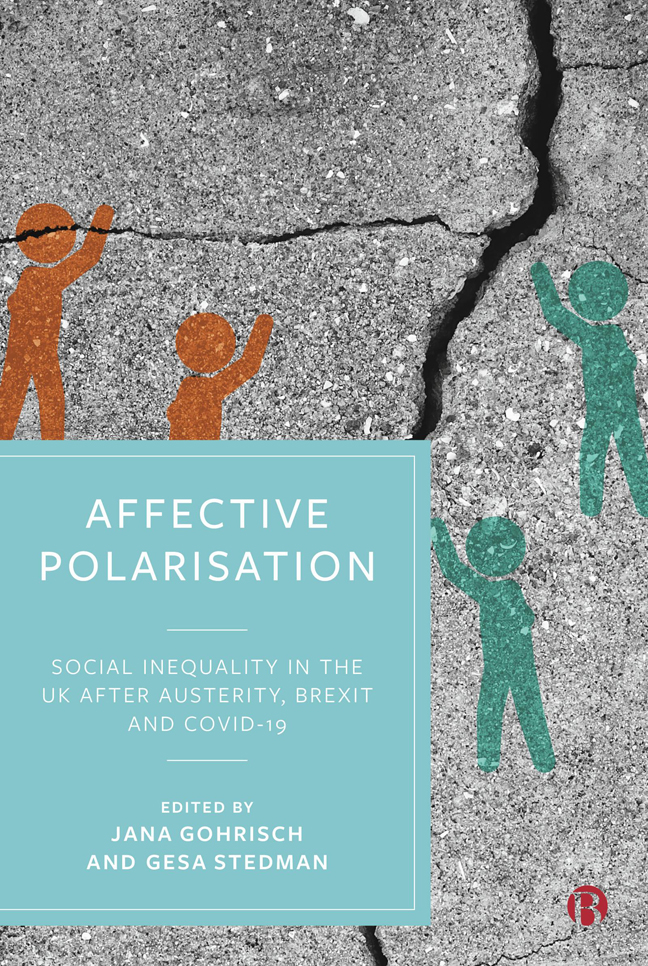Book contents
- Frontmatter
- Contents
- List of Figures, Tables and Boxes
- Notes on Contributors
- Acknowledgements
- Introduction
- 1 The Divided Left in the UK: Partisanship, Ideology and Class after Brexit
- 2 Populism and the People: Elitism, Authoritarianism and Libertarianism
- 3 ‘Coloring the Utterance with Some Kind of Perceivable Affect’: Constructing ‘Country’ and ‘People’ in Speeches by Theresa May and Boris Johnson – A Linguistic Perspective
- 4 The Challenges of Polarisation: Lessons for (Re-)Politicising Inequality across Four English Towns
- 5 “Go Away, But Don't Leave Us”: Affective Polarisation and the Precarisation of Romanian Essential Workers in the UK
- 6 Racialised Affective Polarisation in the UK
- 7 “Now You Have to Listen”: A Historical Analysis of Britain’s Left-Behind Communities
- 8 Britain in a State of Emergency: Studying Ken Loach's Films I, Daniel Blake (2016) and Sorry We Missed You (2019)
- 9 Cloaking Class: Making the Working Class Visible
- 10 Class, Poverty and Inequality in Scotland: Independence and the Creation of Affective Polarisations
- 11 Language and Identity: The Taliesin Tradition
- Conclusion
- Index
6 - Racialised Affective Polarisation in the UK
Published online by Cambridge University Press: 23 January 2024
- Frontmatter
- Contents
- List of Figures, Tables and Boxes
- Notes on Contributors
- Acknowledgements
- Introduction
- 1 The Divided Left in the UK: Partisanship, Ideology and Class after Brexit
- 2 Populism and the People: Elitism, Authoritarianism and Libertarianism
- 3 ‘Coloring the Utterance with Some Kind of Perceivable Affect’: Constructing ‘Country’ and ‘People’ in Speeches by Theresa May and Boris Johnson – A Linguistic Perspective
- 4 The Challenges of Polarisation: Lessons for (Re-)Politicising Inequality across Four English Towns
- 5 “Go Away, But Don't Leave Us”: Affective Polarisation and the Precarisation of Romanian Essential Workers in the UK
- 6 Racialised Affective Polarisation in the UK
- 7 “Now You Have to Listen”: A Historical Analysis of Britain’s Left-Behind Communities
- 8 Britain in a State of Emergency: Studying Ken Loach's Films I, Daniel Blake (2016) and Sorry We Missed You (2019)
- 9 Cloaking Class: Making the Working Class Visible
- 10 Class, Poverty and Inequality in Scotland: Independence and the Creation of Affective Polarisations
- 11 Language and Identity: The Taliesin Tradition
- Conclusion
- Index
Summary
Introduction
Reni Eddo-Lodge begins her polemic Why I’m No Longer Talking to White People about Race (2017) by indicting ‘the emotional disconnect that white people display when a person of colour articulates their experience’ (Eddo-Lodge, 2017, p ix). White people, she continues, behave as if their skin colour was ‘the norm’ and they ‘truly believe that the experiences of their life as a result of their skin colour can and should be universal’ (Eddo-Lodge, 2017, p ix). She appeals to her readers to channel their anger and use it to overcome racial inequality. The book surged in sales during the Black Lives Matter (BLM) protests in the US and the UK in 2020 and 2021. This chapter reads it, and similar titles, as an intervention into the current conjuncture to take a closer look at this particular discourse and its argumentative thrust.
Social inequality in the UK and elsewhere has been severely exacerbated during and following austerity politics, Brexit and the COVID-19 pandemic. One fault line, which has emerged early on, is that which runs along the colour line (see the Introduction to this volume). How then can one read the responses against racial inequality brought to the fore during BLM? From an intersectional perspective, one cannot easily separate the impact of race and ethnicity from other factors such as class, gender, geography and age as they have to be analysed together. More importantly still, the current movement needs to be seen as part of a historical trajectory. Comparing older and more recent activism and publishing in Britain throws patterns into relief and shows where salient differences lie. One of the differences follows from the affective argument, which many activist writers make. This in turn is linked to an upsurge in both emotion research (‘affect studies’) and emotion-based memoirs, books of advice, popular culture and accounts by activists. However, basing political activism solely on individual emotional experience and addressing audiences on the level of morality only will not lead to structural change as it continues to hold the individual liable, thus reinforcing neoliberal tenets of individualist responsibility for economic, social and individual ‘success’. This appeal to the emotions also links with the idea of affective polarisation, which is a key concept structuring the current volume.
- Type
- Chapter
- Information
- Affective PolarisationSocial Inequality in the UK after Austerity, Brexit and COVID-19, pp. 125 - 141Publisher: Bristol University PressPrint publication year: 2023



